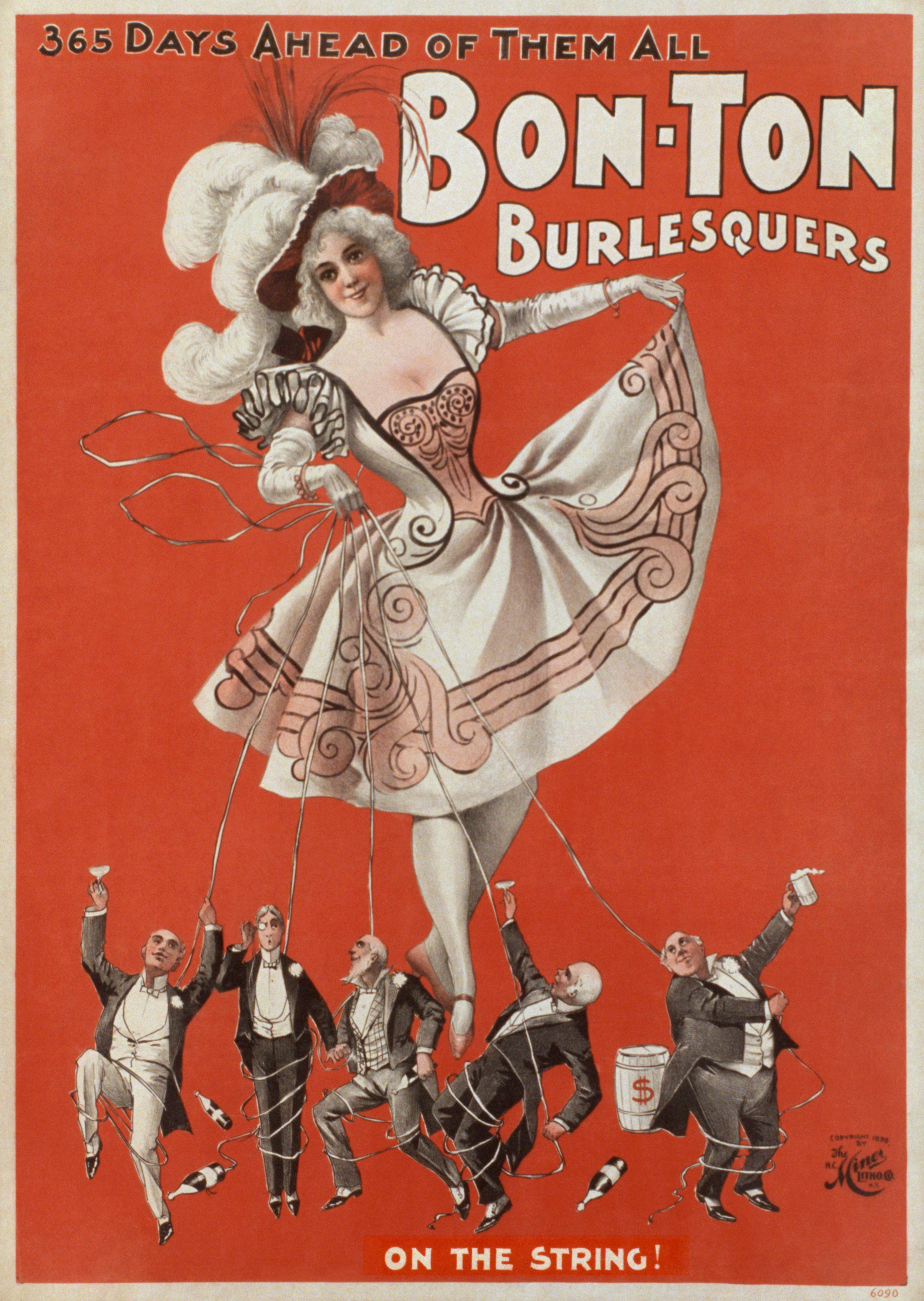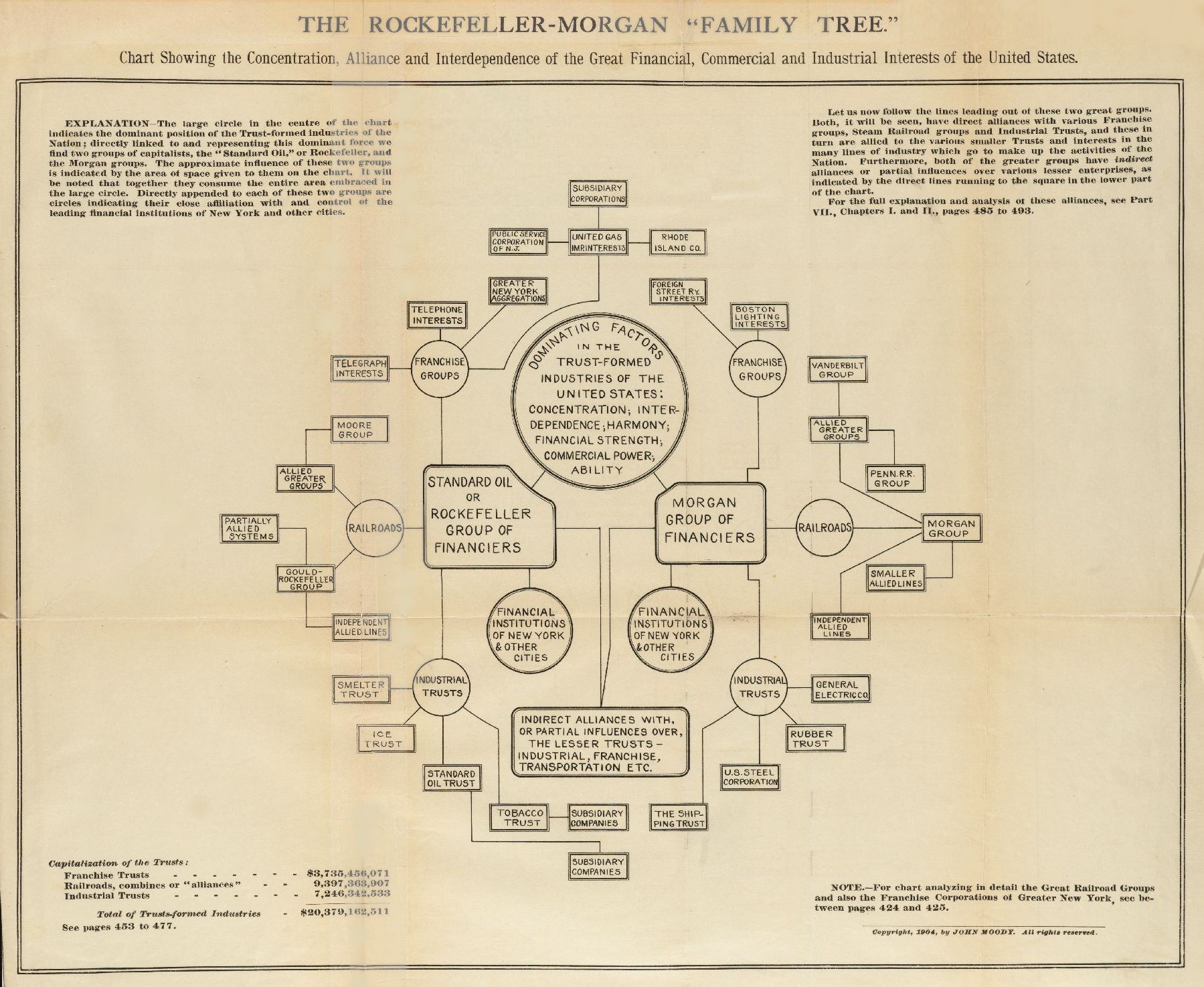|
Beef Trust (burlesque)
Beef Trust, in the context of American burlesque, was a chorus line composed of large and beautiful women known as Billy Watson's "Beef Trust." Use of the phrase in American burlesque was adopted after the turn of the 20th century (around 1909) by Billy Watson ''(né'' Isaac Levy; 1852–1945), a comedian, theater manager, and stock company entrepreneur. History Watson branded the name "Beef Trust" to represent a burlesque act featuring large beautiful women (e.g., "Three Tons of Women") who performed in his burlesque musical revues. The act became nationally known as "Billy Watson's 'Beef Trust.'" The phrase "Beef Trust," in burlesque, was exclusive to Watson's shows; and the phrase – in connection with Watson's shows – was not pejorative. That is, the phrase was "founded on a belief that beauty was based on plumpness." Watson conceived and introduced the "Beef Trust" show in an era that followed a sobering reality encapsulated in a 1906 novel, '' The Jungle'' – Upton ... [...More Info...] [...Related Items...] OR: [Wikipedia] [Google] [Baidu] |
American Burlesque
American burlesque is a genre of variety show derived from elements of Victorian burlesque, music hall and minstrel shows. Burlesque became popular in America in the late 1860s and slowly evolved to feature ribald comedy and female nudity. By the late 1920s, the striptease element overshadowed the comedy and subjected burlesque to extensive local legislation. Burlesque gradually lost popularity beginning in the 1940s. A number of producers sought to capitalize on nostalgia for the entertainment by recreating burlesque on the stage and in Hollywood films from the 1930s to the 1960s. There has been a resurgence of interest in this format since the 1990s. Literary and theatrical origins The term "burlesque" more generally means a literary, dramatic or musical work intended to cause laughter by caricaturing the manner or spirit of serious works, or by ludicrous treatment of their subjects. [...More Info...] [...Related Items...] OR: [Wikipedia] [Google] [Baidu] |
Morris & Company
Morris and Company, was one of several meatpacking companies in Chicago, Illinois, and in South Omaha, Nebraska. History Morris & Company was founded by Nelson Morris in Chicago. In 1902, with Nelson's son, Edward Morris as president, it agreed to merge with the other two (Armour & Company and Swift & Company) to form a giant corporation called the National Packing Company. Conceived primarily as a holding company, National Packing soon began buying up smaller meat companies, such as G. H. Hammond and Fowler. Between 1904 and 1910, National Packing acquired 23 stockyards and slaughtering plants nationwide, which gave it control over about one-tenth of U.S. meat production. The company owned branches in over 150 cities around the world, along with a fleet of 2,600 refrigerated railcars. Starting in 1905, the constituent companies in National Packing were targeted by Arba Seymour Van Valkenburgh under the Elkins Act. Pressure from U.S. government regulators forced the dissolut ... [...More Info...] [...Related Items...] OR: [Wikipedia] [Google] [Baidu] |
Market Manipulation
In economics and finance, market manipulation is a type of market abuse where there is a deliberate attempt to interfere with the free and fair operation of the market; the most blatant of cases involve creating false or misleading appearances with respect to the price of, or market for, a product, security or commodity. Market manipulation is prohibited in most countries, in particular, it is prohibited in the United States under Section 9(a)(2) of the Securities Exchange Act of 1934, in the European Union under Article 12 of the ''Market Abuse Regulation'', in Australia under Section 1041A of the Corporations Act 2001, and in Israel under Section 54(a) of the securities act of 1968. In the US, market manipulation is also prohibited for wholesale electricity markets under Section 222 of the Federal Power Act and wholesale natural gas markets under Section 4A of the Natural Gas Act. The US Securities Exchange Act defines market manipulation as "transactions which crea ... [...More Info...] [...Related Items...] OR: [Wikipedia] [Google] [Baidu] |
Collusion
Collusion is a deceitful agreement or secret cooperation between two or more parties to limit open competition by deceiving, misleading or defrauding others of their legal right. Collusion is not always considered illegal. It can be used to attain objectives forbidden by law; for example, by defrauding or gaining an unfair market advantage. It is an agreement among firms or individuals to divide a market, set prices, limit production or limit opportunities. It can involve "unions, wage fixing, kickbacks, or misrepresenting the independence of the relationship between the colluding parties". In legal terms, all acts effected by collusion are considered void. Definition In the study of economics and market competition, collusion takes place within an industry when rival companies cooperate for their mutual benefit. Conspiracy usually involves an agreement between two or more sellers to take action to suppress competition between sellers in the market. Because competition am ... [...More Info...] [...Related Items...] OR: [Wikipedia] [Google] [Baidu] |
Trust (business)
A trust or corporate trust is a large grouping of business interests with significant market power, which may be embodied as a corporation or as a group of corporations that cooperate with one another in various ways. These ways can include constituting a trade association, owning stock in one another, constituting a corporate group (sometimes specifically a conglomerate), or combinations thereof. The term ''trust'' is often used in a historical sense to refer to monopolies or near-monopolies in the United States during the Second Industrial Revolution in the 19th century and early 20th century. The use of corporate trusts during this period is the historical reason for the name " antitrust law". In the broader sense of the term, relating to trust law, a trust is a centuries-old legal arrangement whereby one party conveys legal possession and title of certain property to a second party, called a trustee. While that trustee has ownership, they cannot use the property for herself, ... [...More Info...] [...Related Items...] OR: [Wikipedia] [Google] [Baidu] |
United States
The United States of America (U.S.A. or USA), commonly known as the United States (U.S. or US) or America, is a country primarily located in North America. It consists of 50 U.S. state, states, a Washington, D.C., federal district, five major unincorporated territories, nine United States Minor Outlying Islands, Minor Outlying Islands, and 326 Indian reservations. The United States is also in Compact of Free Association, free association with three Oceania, Pacific Island Sovereign state, sovereign states: the Federated States of Micronesia, the Marshall Islands, and the Palau, Republic of Palau. It is the world's List of countries and dependencies by area, third-largest country by both land and total area. It shares land borders Canada–United States border, with Canada to its north and Mexico–United States border, with Mexico to its south and has maritime borders with the Bahamas, Cuba, Russia, and other nations. With a population of over 333 million, it is the List of ... [...More Info...] [...Related Items...] OR: [Wikipedia] [Google] [Baidu] |
Wilmington, Delaware
Wilmington (Lenape: ''Paxahakink /'' ''Pakehakink)'' is the largest city in the U.S. state of Delaware. The city was built on the site of Fort Christina, the first Swedish settlement in North America. It lies at the confluence of the Christina River and Brandywine Creek, near where the Christina flows into the Delaware River. It is the county seat of New Castle County and one of the major cities in the Delaware Valley metropolitan area. Wilmington was named by Proprietor Thomas Penn after his friend Spencer Compton, Earl of Wilmington, who was prime minister during the reign of George II of Great Britain. At the 2020 census, the city's population was 70,898. The Wilmington Metropolitan Division, comprising New Castle County, Delaware, Cecil County, Maryland and Salem County, New Jersey, had an estimated 2016 population of 719,887. Wilmington is part of the Delaware Valley metropolitan statistical area, which also includes Philadelphia, Reading, Camden, and other ... [...More Info...] [...Related Items...] OR: [Wikipedia] [Google] [Baidu] |
Vaudeville
Vaudeville (; ) is a theatrical genre of variety entertainment born in France at the end of the 19th century. A vaudeville was originally a comedy without psychological or moral intentions, based on a comical situation: a dramatic composition or light poetry, interspersed with songs or ballets. It became popular in the United States and Canada from the early 1880s until the early 1930s, but the idea of vaudeville's theatre changed radically from its French antecedent. In some ways analogous to music hall from Victorian Britain, a typical North American vaudeville performance was made up of a series of separate, unrelated acts grouped together on a common bill. Types of acts have included popular and classical musicians, singers, dancers, comedians, trained animals, magicians, ventriloquists, strongmen, female and male impersonators, acrobats, clowns, illustrated songs, jugglers, one-act plays or scenes from plays, athletes, lecturing celebrities, minstrels, a ... [...More Info...] [...Related Items...] OR: [Wikipedia] [Google] [Baidu] |
Columbia Amusement Company
The Columbia Amusement Company, also called the Columbia Wheel or the Eastern Burlesque Wheel, was a show business organization that produced burlesque shows in the United States between 1902 and 1927. Each year, about four dozen Columbia burlesque companies would travel in succession round a "wheel" of theaters, ensuring steady employment for performers and a steady supply of new shows for participating theaters. For much of its history the Columbia Wheel promoted relatively "clean" variety shows featuring comedians and pretty girls. Eventually the wheel was forced out of business due to changing tastes and competition from its one-time subsidiary and eventual rival, the Mutual Burlesque Association, as well as cinemas and cruder stock burlesque companies. Background Following the lead of legitimate theater owners and vaudeville producers who organized to provide the public with quality acts and theaters with a steady stream of product, burlesque producers and theater managers in 1 ... [...More Info...] [...Related Items...] OR: [Wikipedia] [Google] [Baidu] |
Variety (magazine)
''Variety'' is an American media company owned by Penske Media Corporation. The company was founded by Sime Silverman in New York City in 1905 as a weekly newspaper reporting on theater and vaudeville. In 1933 it added ''Daily Variety'', based in Los Angeles, to cover the motion-picture industry. ''Variety.com'' features entertainment news, reviews, box office results, cover stories, videos, photo galleries and features, plus a credits database, production charts and calendar, with archive content dating back to 1905. History Foundation ''Variety'' has been published since December 16, 1905, when it was launched by Sime Silverman as a weekly periodical covering theater and vaudeville with its headquarters in New York City. Silverman had been fired by ''The Morning Telegraph'' in 1905 for panning an act which had taken out an advert for $50. As a result, he decided to start his own publication "that ouldnot be influenced by advertising." With a loan of $1,500 from his fa ... [...More Info...] [...Related Items...] OR: [Wikipedia] [Google] [Baidu] |
Sime Silverman
Simon J. Silverman (May 19, 1873 – September 22, 1933) was an American journalist and newspaper publisher. He was the founder of the weekly newspaper '' Variety'' in New York City in 1905, which gave theatre and vaudeville reviews and the Hollywood-based '' Daily Variety'' magazine in 1933, focusing on the emerging motion picture film industry. Early life Silverman was born to an American Jewish family on May 19, 1873 in Cortland, New York. His father, Louis J. Silverman, was a businessman. Career Silverman began his career by working for his father. In 1903, he became a journalist for the ''Daily America'' and wrote under the pen name "The Man in the Third Row". After the ''Daily America'' dissolved, he later joined the New York-based ''The Morning Telegraph'' but was fired in 1905 for a notice on a new sketch played by Mrs. Stuart Robson at Proctor's 58th Street theatre where the review mentioned the sketch was n.g. (no good). He was not aware that Mrs. Robson had given t ... [...More Info...] [...Related Items...] OR: [Wikipedia] [Google] [Baidu] |







